Village Travel
As always, it is good to be home. Seems like returning to Bethel always involves a bit of culture shock for me; but the shock is different coming home to Bethel from a village than coming home to Bethel from Anchorage or the Lower 48. With the latter, the shock is how small, rural, grubby and frontier-like Bethel is; with the former, it is how big, developed, and fast-paced Bethel is. Interesting. It really helps me appreciate what my village patients go through when I tell the health aide to send them in to Bethel for further evaluation. That sense of displacement and reality distortion for them rachets up several orders of magnitude when they have to go from the village to Anchorage. They really hate it, except for the week before Christmas when it is nice to have a shopping opportunity.
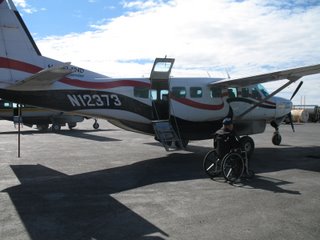 Traveling in the bush is different than any kind of travel in the Lower 48. Almost all of it is done in small planes. This is the Caravan that flew Diane and me up to Pilot Station last week; it is about the largest plane doing regular bush flights. It has 11 seats. The plane we returned on was a Cessna 206, which has six seats and limited luggage capacity. We thought we would have to leave some of our luggage in the village to be sent the next day, but fortunately the other three passengers had very little, so it all fit.
Traveling in the bush is different than any kind of travel in the Lower 48. Almost all of it is done in small planes. This is the Caravan that flew Diane and me up to Pilot Station last week; it is about the largest plane doing regular bush flights. It has 11 seats. The plane we returned on was a Cessna 206, which has six seats and limited luggage capacity. We thought we would have to leave some of our luggage in the village to be sent the next day, but fortunately the other three passengers had very little, so it all fit.Bush travel demands a lot of the traveler. The first rule is that it is really your own decision whether or not to fly at all. In the Lower 48, if the plane is going, then you can figure that you are safe to get on it; if it is not safe, then the plane won't go. Not so in bush Alaska; bush pilots are a cowboy breed to start with, willing to take on all kinds of wild weather. You can generally trust the mechanical functioning of the plane itself, but it is ultimately up to you whether you think the weather is safe enough to fly in. You could have a crazy pilot who will batter the plane ragged against a wall of wind, trying to get you there.
The second rule of bush travel is to dress like you are going to crash. Literally. Because you might. In winter that means full snow pants and parka, snow boots, fur hat, fur gloves, fleece underneath, head lamp with fresh batteries, matches, pocket knife, water bottle in an inside pocket, and protein snacks like dried fish and nuts. Most planes fly at much lower altitudes (less than a thousand feet; there is nothing to run into out here) and most crashes are survivable. You just have to be prepared to hunker down and wait for Search and Rescue.
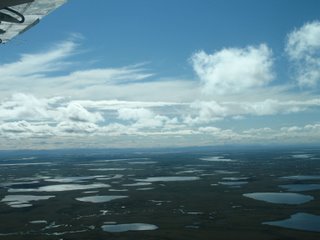
In summer, the terrain you are flying over looks like this. There is a lot of water down there. Even the part that looks like dry land is pretty squishy. If you had to go down there, you'd want rubber knee boots and lots of bug dope. I should interject here that I don't mean to imply that crashes are frequent; they are not. But we do usually have two or three a year in the Delta, and it is best to be prepared.
The third rule of bush travel is to be prepared to have to stay in a village two to three days longer than planned, especially in winter. The weather can change fast out here. Perfectly good flying conditions on the outbound trip may crumble to zero visibility and high winds in a few hours. It is a common experience to be "weathered in" a few extra days in a village. Being prepared for this primarily means having extra food with you. When you travel to a village, one of the most important things you must take is every single bite of food you will eat for the entire stay. You cannot assume that people will invite you home for dinner, and you cannot assume that there will be anything to buy at the village store. And there sure ain't no restaurants! Careful planning beforehand is crucial, and comfort foods are essential; I always take pasta, chocolate, and fresh fruit.
I have been very lucky in doing village travel; I have only been weathered in once, and then only for one extra day. And I've never crashed (knock on wood). Fortunately, I love flying in small planes. My dad flew a Cessna 172 when I was growing up, and we made lots of trips in it. One of my small regrets in life is that I declined when he offered me the opportunity to get my pilot's license when I turned 16. At that point I was more interested in driving a car.
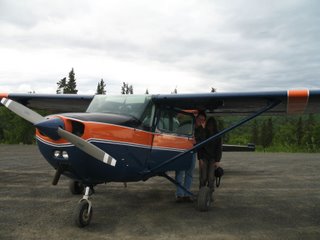
During our week in Pilot Station, Diane's husband Andre flew up for a visit. He is a pilot who teaches at the flight school in Bethel. He took us for a short joy ride up and down the Yukon River in his Cessna 172. It was lots of fun. We circled over the villages of St. Mary's (pop. about 500), Pitka's Point (pop. less than 100), and Mountain Village (pop. about 650). We did a touch-and-go at Mountain Village which was interesting; the airstrip is on an incline, and we landed and took off going uphill. Never done that before.
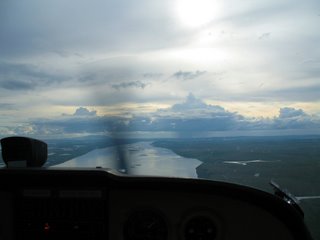
Looking straight down the Yukon River.
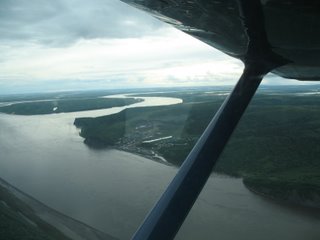
Village travel is fascinating, exciting, and enriching in many ways. It is also exhausting, and I am really glad to be home.
Labels: Tundra Life




4 Comments:
TPA you should've been a travelogue writer. You make the harsh lifestyle sound positively inviting!!
Thanks, scan man! Interesting you should say that; before I went into medicine, being a travel writer/photographer was my dream of an ideal job. Perhaps I'm now combining the two, ah?
Interesting stuff that puddle jumper flying. If my wife see your rule 2, dress like you will crash, I am afraid she will not be convinced to move to Alaska. But the pictures may help convince her. Good stuff all around!
Thanks, Al! Perhaps the answer for your wife is simply not to do village travel. If you want her to consider Alaska, you probably don't want to bring her out this way at all; stay in the Interior or Southcentral or Southeast where the trees are tall and the mountains are gorgeous.
Post a Comment
<< Home